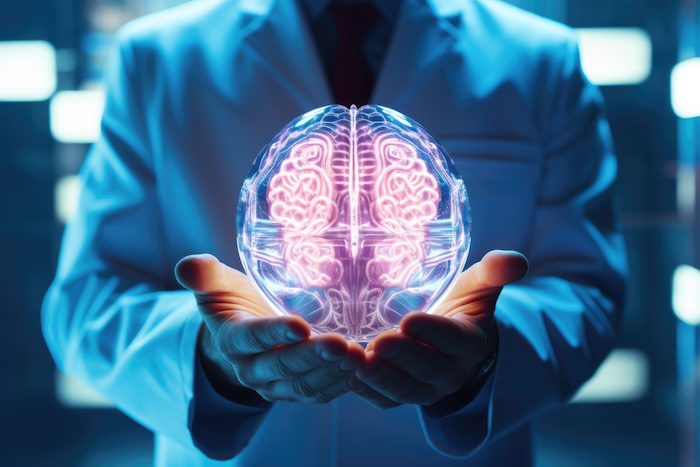As a life coach and brain mapping specialist, I emphasize the profound impact that your brain health has on your quality of life.
Clear decision-making, driven by a healthy brain, is essential for achieving personal fulfillment and contributing positively to the world. Unfortunately, our current approach to brain health is often reactive, addressing issues only when they become severe, like in cases of dementia or Alzheimer’s.
Instead, we need to adopt a proactive stance to protect our cognitive functioning as we age.
The Importance of a Proactive Approach to Brain Health
Current Paradigm: Reactive vs. Proactive
The traditional approach to brain health is reactive, focusing on intervention after problems arise. However, to maintain sharpness and cognitive vitality as you age, you must take charge of your brain health way before you experience symptoms.
The environment you live in is not always conducive to optimal brain health, which makes it all the more important that you take personal responsibility and proactive measures.
Understanding Your Brain
The Key Brain Regions and Their Functions
- Frontal Lobes: Responsible for memory, abstract thinking, creativity, decision-making, voluntary motor tasks, planning for the future, reward processing, and maintaining attention. The frontal lobes are the most commonly injured brain region.
- Prefrontal Cortex: Critical for planning complex behavior, social behavior, and executive functioning. It enables future planning and self-control, preventing impulsive reactions.
- Temporal Lobes: Involved in memory, emotion, hearing, and language comprehension.
- Hippocampus: Essential for memory formation; damaged in Alzheimer’s disease and implicated in depression.
- Amygdala: Central to emotional processing.
- Parietal Lobes: Handle sensory data processing, visual perception, and reading.
- Occipital Lobes: Receive and process visual data, and contribute to reading.
- Cerebellum: Contains 80% of the brain’s neurons and is involved in coordination, balance, movement, and muscle tone.
The Role of Brain Cells
Neurons: The primary cells responsible for transmitting information.
Glial Cells: Provide energy, promote plasticity, and modulate inflammation in the brain.
Microglial Cells: Act as the brain’s immune system.
Astrocytes: Uptake metabolites from neurons and contribute to the blood-brain barrier.
Oligodendrocytes: Myelinate neurons, allowing for faster signal transmission.
Neurotransmitters: Acetylcholine, dopamine, norepinephrine, GABA, serotonin, and glutamate are crucial for neuron communication and mental health.
Body-Brain Influences: How Your Physiology Affects Brain Health
Understanding how the body influences brain health is crucial for you to maintain cognitive function and overall well-being.
The intricate relationship between your physical health and brain function underscores the importance of a holistic approach to health.
Let’s explore the key physiological factors that impact brain health.
Metabolic Health
Metabolic health refers to how well your body generates and uses energy. Good metabolic health ensures that your body maintains optimal levels of blood sugar, cholesterol, triglycerides, and blood pressure.
Here’s how it affects the brain:
- Energy Supply: The brain requires a continuous supply of energy to function correctly. Efficient metabolism ensures that the brain receives the necessary glucose and oxygen.
- Inflammation: Poor metabolic health can lead to chronic inflammation, which negatively affects brain health and increases the risk of neurodegenerative diseases.
- Mitochondrial Function: Mitochondria are the powerhouses of cells, including brain cells. Healthy mitochondria are essential for maintaining cognitive function and preventing neurological diseases. Please check Arthrogenix reviews
Glucose Utilization
Glucose is the primary fuel for the brain. Effective glucose utilization is crucial for brain health:
- Cognitive Function: The brain consumes about 20% of the body’s glucose. Proper glucose metabolism ensures that the brain has a constant energy supply, which is critical for cognitive functions like memory, attention, and decision-making.
- Insulin Sensitivity: Insulin helps regulate glucose levels in the blood. Insulin resistance, often a result of poor diet and lack of exercise, can impair glucose uptake in the brain, leading to cognitive decline and increased risk of Alzheimer’s disease.
Insulin Levels
Insulin is a hormone that regulates blood sugar levels and plays a significant role in brain health:
- Neurotransmitter Regulation: Insulin influences the levels of neurotransmitters in the brain, which are crucial for mood regulation and cognitive functions.
- Cognitive Health: High levels of insulin (hyperinsulinemia) or insulin resistance can lead to decreased brain function and increase the risk of dementia and other neurodegenerative conditions.
- Neuroprotection: Insulin has protective effects on neurons. Maintaining balanced insulin levels supports neuronal health and function.
Hormones
Hormones are chemical messengers that regulate various bodily functions, including brain activity:
- Stress Hormones: Cortisol, the primary stress hormone, can affect brain function. Chronic high levels of cortisol can lead to neuronal damage and impair memory and learning.
- Sex Hormones: Estrogen and testosterone also play roles in brain health. Estrogen, for example, has neuroprotective effects and supports memory and cognitive function.
- Thyroid Hormones: These hormones regulate metabolism and influence brain development and function. Imbalances can lead to cognitive deficits and mood disorders.
Gastrointestinal Tract Health
The gut-brain axis is the communication between the gut and the brain. Gut health significantly impacts brain health in the following ways:
- Microbiome: The gut microbiome, composed of trillions of microorganisms, affects brain function and mental health. A healthy gut microbiome promotes the production of neurotransmitters like serotonin.
- Immune Function: The gut houses a large part of the immune system. Gut health influences systemic inflammation, which can affect brain health and increase the risk of neurodegenerative diseases.
- Nutrient Absorption: The gut is responsible for nutrient absorption. Essential nutrients like omega-3 fatty acids, vitamins, and minerals are critical for brain health and function. Poor gut health can lead to nutrient deficiencies that impair cognitive function.
How You Can Change Your Brain in Real Time
The brain is an incredibly dynamic organ, constantly changing and adapting in response to various internal and external factors. One of the most significant influences on brain health is what we consume.
Alcohol, psychedelics, caffeine, and prescription drugs can all profoundly impact brain function, brain health restoration, and structure. Understanding these effects can help you make more informed choices about your consumption habits.
Alcohol
Alcohol consumption can have both short-term and long-term effects on the brain:
Short-Term Effects:
Impaired Cognitive Function: Alcohol can impair judgment, coordination, and reaction times.
Memory Disruption: Drinking alcohol can interfere with the brain’s ability to form new memories, leading to short-term memory loss.
Neurotransmitter Imbalance: Alcohol affects neurotransmitters like GABA and glutamate, which can alter mood and behavior.
Long-Term Effects:
Brain Shrinkage: Chronic alcohol consumption can lead to a reduction in brain volume, particularly in the frontal lobes, which are crucial for executive functions.
Neurodegeneration: Long-term alcohol abuse can cause neurodegenerative changes, increasing the risk of conditions like dementia and Wernicke-Korsakoff syndrome.
Mental Health Issues: Prolonged alcohol use is linked to depression, anxiety, and other mental health disorders.
Psychedelics
Psychedelics, such as LSD, psilocybin, and MDMA, can have significant effects on the brain:
Short-Term Effects:
Altered Perception: Psychedelics can cause profound changes in perception, mood, and thought processes.
Increased Connectivity: These substances can temporarily enhance connectivity between different brain regions, leading to unique cognitive and emotional experiences.
Long-Term Effects:
Potential Therapeutic Benefits: Research suggests that psychedelics may have therapeutic potential for conditions like PTSD, depression, and anxiety by promoting neuroplasticity and emotional breakthroughs.
Neuroplasticity: Psychedelics may enhance neuroplasticity, helping the brain to form new neural connections and potentially leading to long-term cognitive and emotional benefits.
Risks: There are risks associated with psychedelic use, including the potential for triggering psychotic episodes in susceptible individuals and the need for controlled, therapeutic settings to avoid negative outcomes.
Caffeine
Caffeine, the most widely consumed psychoactive substance, has various effects on the brain:
Short-Term Effects:
Increased Alertness: Caffeine blocks adenosine receptors, reducing feelings of tiredness and increasing alertness and concentration.
Enhanced Mood: It can temporarily boost mood by increasing dopamine production.
Long-Term Effects:
Cognitive Benefits: Regular, moderate caffeine consumption has been associated with reduced risks of cognitive decline and neurodegenerative diseases like Alzheimer’s and Parkinson’s.
Tolerance and Dependence: Over time, the brain can develop a tolerance to caffeine, requiring higher doses to achieve the same effects. Withdrawal symptoms can include headaches, fatigue, and irritability.
Sleep Disruption: Excessive caffeine intake, especially later in the day, can disrupt sleep patterns, negatively affecting overall brain health and cognitive function.
Prescription Drugs
Prescription drugs, including psychiatric, antidepressant, and cognitive medications, play critical roles in managing various health conditions, but also affect the brain:
Psychiatric Medications:
Stabilizing Neurotransmitters: Drugs like antipsychotics help stabilize neurotransmitter levels, reducing symptoms of disorders like schizophrenia and bipolar disorder.
Side Effects: Long-term use can lead to side effects such as weight gain, metabolic changes, and sometimes cognitive dulling.
Antidepressants:
Mood Regulation: Antidepressants like SSRIs increase serotonin levels, helping to alleviate symptoms of depression and anxiety.
Neurogenesis: Some studies suggest that antidepressants may promote neurogenesis, particularly in the hippocampus, which is involved in mood regulation and memory.
Withdrawal and Dependence: Discontinuing antidepressants can lead to withdrawal symptoms and should be managed carefully with medical supervision.
Cognitive Enhancers:
Improved Focus and Memory: Medications like stimulants (e.g., Adderall) are used to enhance focus and memory, particularly in conditions like ADHD.
Potential for Abuse: These drugs can be habit-forming and may have side effects like increased heart rate, anxiety, and potential for misuse and dependency.
Conclusion
The substances you consume can significantly influence your brain’s health and functioning. While some, like caffeine and prescription medications, can have beneficial effects when used appropriately, others, like alcohol and psychedelics, require careful consideration due to their potential risks and benefits.
By understanding these impacts, you can make more informed decisions to support your brain health and overall well-being.
As a life coach, I encourage you to be mindful of your consumption habits and consider their long-term effects on your cognitive and emotional health.
As a brain mapping specialist, I encourage you to consider getting your brain mapped so you can visually see the health and wellness of your brain. If necessary, you can get a highly personalized way to train your brain and improve its performance.







Recent Comments